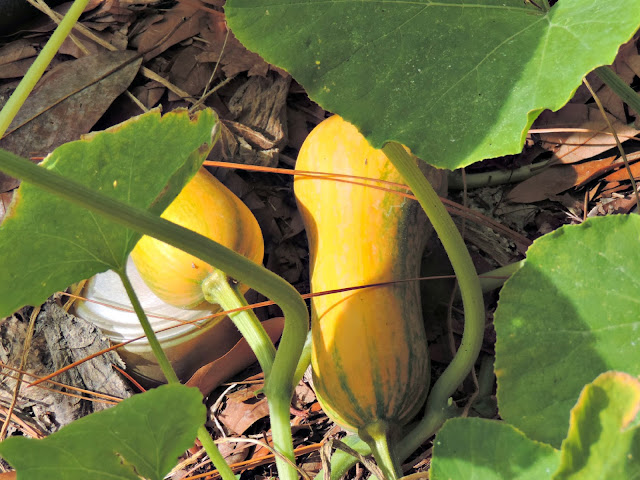Mama Kat Thursday: Something I'm Growing
For Mama Kat today, I'm going to share some garden vegetable photos in answer to "Show Us Something You're Growing?"
Butternut Squash:
New for this year, I planted this "small garden" type of butternut squash. It's highly productive on a short vine that doesn't exceed about 6 feet and makes a smaller fruit then the kind you see at the grocery.
I can already tell the vines are done producing as the squash are all changing color toward tan, which means they're getting ripe.
I can already tell the vines are done producing as the squash are all changing color toward tan, which means they're getting ripe.
The sunlight makes them appear more yellow then they are actually. Took this shot this morning.
Container Pickle Cucumbers
This seed was a new try this year, too. It's designed to grow in a container---perfect for my in-ground clay pots I put next to the veggie garden! I planted two. They have short, climbing vines and are extremely productive. I put tomato cages in the pots for them climb, which keeps them off the ground. (To keep them out of reach of box turtles, who will dine on that sort of thing!)
They make 4 to 5 inch cucumbers that are so delicious and crisp!
Also took this shot this morning. Surprisingly good texture shot.
If you have a small space in-ground garden, a raised garden or want to garden in containers, I highly recommend checking out what online seed companies have available for small gardens & containers, since that's almost the only place you'll find such specialized hybrids.
I got these seeds from Park Seed, but Burpee also has a good selection.
(I'm not affiliated with either company.)
**********
**********
In case you don't know, hybridizing is a classic method of attaining new strains of a given plant, like a tomato for instance, where tomatoes with certain desirable traits are painstakingly cross-pollinated by hand, then the off-spring from the resulting seed are planted, grown and checked for the best of those desirable traits, then the process is repeated until they get a plant not only with those traits, but also able to reproduce those same traits faithfully in subsequent seed.
Developing a hybrid can take 10, 15 or more years.
Fun Fact: the Bananas you currently buy at the grocery store are a hybrid, developed in a greenhouse by an English Duke, 194 years ago.
Hybriders can, like anyone else who creates something new, apply to patent their creations, which protects their right to earn from their creation for a set period of time. Not unlike copyright law protects writers & other creatives.
Fun Fact: the Bananas you currently buy at the grocery store are a hybrid, developed in a greenhouse by an English Duke, 194 years ago.
Hybriders can, like anyone else who creates something new, apply to patent their creations, which protects their right to earn from their creation for a set period of time. Not unlike copyright law protects writers & other creatives.
(I read up on plant patent law & patent law in general and it's an education, believe me. Specific rules, costly to set up and huge yearly fees.)
Thanks for Visiting!








Comments
Post a Comment
Thanks for leaving a comment!